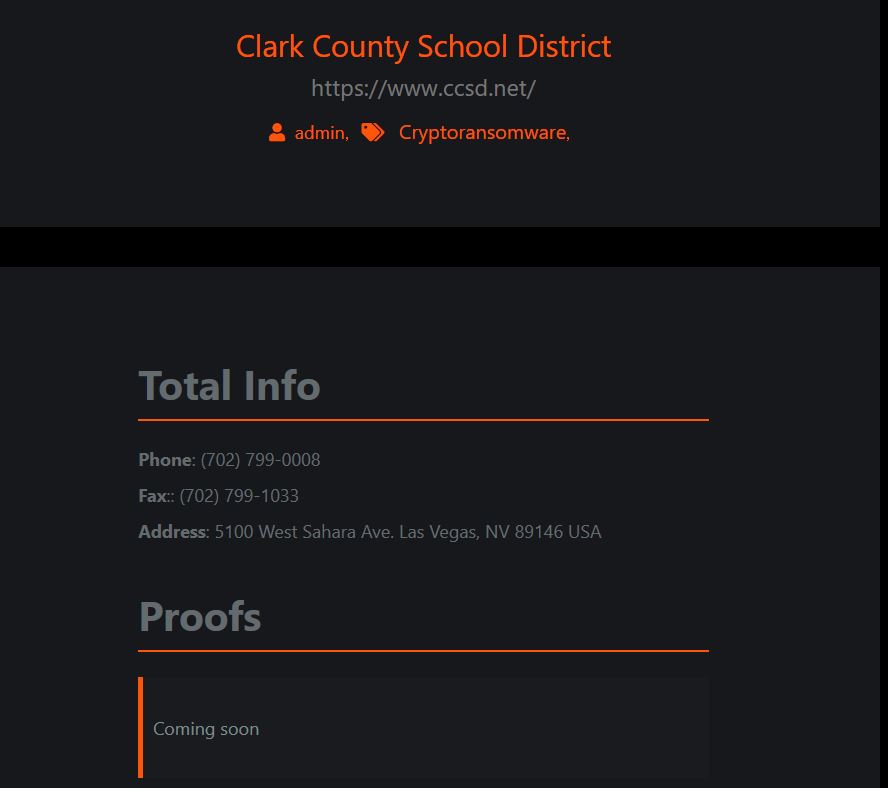On August 27, Clark County School District (CCSD) in Nevada experienced a data security incident that they disclosed the next day. And on September 8, they issued an update. The update noted that the attack was a ransomware attack. Although the district stated it had seen no evidence of misuse, they were notifying everyone to be alert:
On the morning of August 27, 2020, certain CCSD systems became infected with a virus that prohibited access to certain files. Upon discovery, CCSD immediately notified law enforcement and began an investigation, which included working with third-party forensic investigators, to determine the full nature and scope of the incident and to secure the CCSD network. While the investigation into this incident is ongoing, it was determined that CCSD was the victim of a criminal ransomware attack and is working to restore all systems to secure, full functionality.
What Information Was Involved?
While CCSD’s investigation is ongoing and has been unable to determine whether any specific file containing sensitive information was actually accessed or acquired by the unauthorized actor, CCSD’s investigation determined that certain current and former employee information may have been accessed or acquired by the unauthorized actor. Therefore, in an abundance of caution, CCSD is notifying individuals, including certain current and former employees, of this incident whose name and Social Security numbers were present in the affected systems at the time of the incident.
Read their full notice of September 8 here. It did not specifically address whether there was any evidence that student data was accessed or exfiltrated, but the notice seems to only be addressing employee data.
It now appears that the district was attacked by Maze who have now added the district’s name to their leak site’s list of victims who have not cooperated with paying their ransom demands.

Interestingly, the threat actors have not posted any proof, simply noting that it is “coming soon.” Whether they have sent the district any proof via other channels is unknown to DataBreaches.net.
Although they have not said so explicitly in their notice, it sounds like CCSD, which is the fifth largest school district in the U.S., has no intention of paying any ransom.
Maze is the same group of threat actors that also recently attacked Fairfax County Public Schools (FCPS) in Virginia. FCPS is the eleventh largest public school district in the country. After that attack started drawing media attention, FCPS’s name suddenly disappeared from Maze’s leak site. The removal of a name may indicate that the FCPS entered into negotiations with the threat actors or agreed to pay some ransom, but the district has provided no update that would shed light on what happened or is happening.
But if Maze has attacked the 5th largest and 11th largest school districts in the country, can other school districts be far behind? Maze has also added an Ohio school district to their leak site today. DataBreaches.net is not naming that district at this time because I have not received a reply asking them to confirm or deny the claimed attack, and the “proof” that Maze provided is pretty suspicious because it doesn’t look like the files would belong to any school district at all.
But is the U.S. Department of Education sending out any advisory with specific tips and strategies to school districts to help them reduce their risk of being successfully attacked by these threat actors? DataBreaches.net reached out to the U.S. Education Department to ask that question, and will update this post when a reply is received.
Update: On September 8 and September 9, Toledo Public Schools in Ohio revealed that they had suffered what sounds like a ransomware attack and were investigating it. So although they have not responded to this site’s inquiries, it seems likely that they were attacked by Maze, even if Maze’s “proof” appears to be files from a different one of their victims.